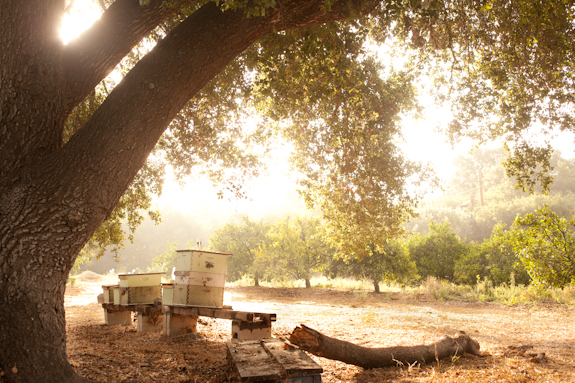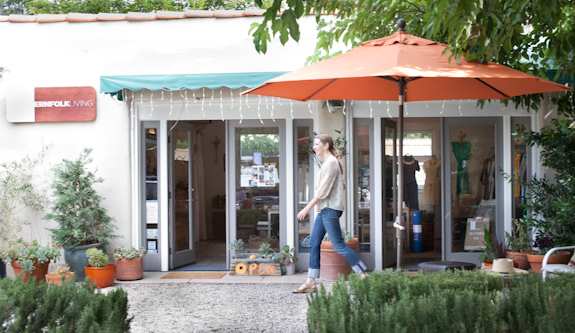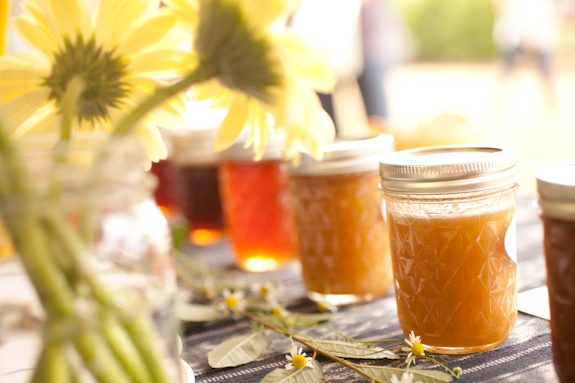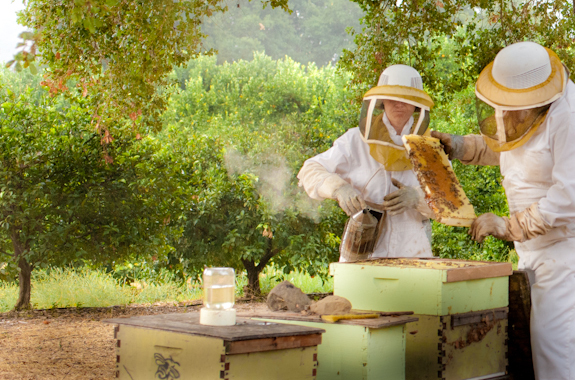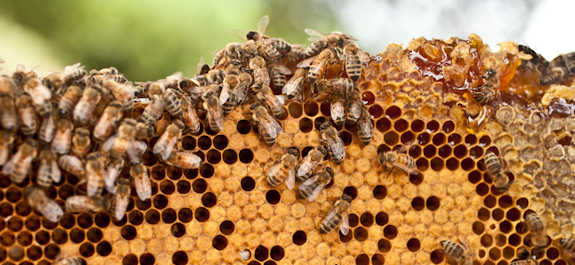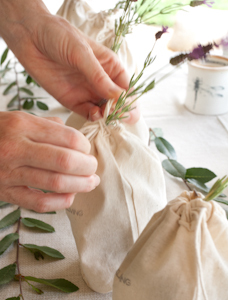Co-Authored by Lee Glenn
Well, not exactly in the garden. More like in the backyard of Wanda's modernist renovation, then in an organic orange grove with beehives. So what ties these disparate locales together? A Kinfolk gathering exploring the nuances of bees, beekeeping and bee ecology, coupled with an artisan honey tasting.
Combining a bunch of purposes, we are in beautiful Ojai, California celebrating Lee's birthday, staying in a beautiful house on an organic farm, visiting Wanda's MODERNFOLKLIVING store in town, shopping for vintage bits as props for Julie's agrarian photography, and learning about bees.
MODERNFOLKLIVING is the project of Wanda Weller Sakai, former design director for Patagonia. Her store has "curated goods" representing modern design with a handcrafted feel sourced regionally whenever possible, a kind of retail design-locavore. In her words, "The shop features mindful, thoughtful, questioning, eco-brands."
One of her related projects is a connection with Kinfolk magazine to build community around gatherings that inform, enlighten and introduce neighbors. For a typical gathering, Kinfolk sets prospective themes, but the local organizers provide the detailed vision, customize to the locale, find a comfortable setting and emphasize participation instead of observation. The honey-tasting is the second of ten events Wanda is planning for this year.
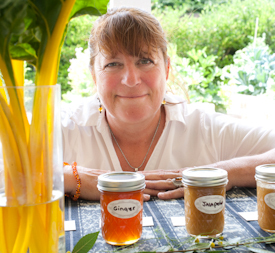 Which brings us to Wanda's backyard and Julie Hobbins & Robyn Dalbey, partners in Honey by Jules in the Garden. Julie is a landscape designer by trade with degrees in horticulture and culinary arts. Robyn is an artist, but kismet brought them together around bees, literally & figuratively.
Which brings us to Wanda's backyard and Julie Hobbins & Robyn Dalbey, partners in Honey by Jules in the Garden. Julie is a landscape designer by trade with degrees in horticulture and culinary arts. Robyn is an artist, but kismet brought them together around bees, literally & figuratively.
Julie is fascinated by the buzzing critters, their social rhythms, their place in the successful ecology of plant species. She has been a "local hobby beekeeper" for 10 years.
"Bees prefer high nectar plants, citrus, eucalyptus, sage, clover. They're the pollinators," she explains to the group gathered round. "Of the pollinators, hummingbirds, moths, bats, butterflies and bees, bees account for 30% of plant pollination. That's how important they are to our planet." That's homeland security.
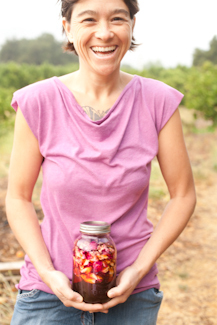 Providence brought Robyn and Julie together. An artist, she was absorbed by scientific illustration for her art, drawing elements from the natural world. While researching the anatomy of honey bees, she connected with Julie, an old acquaintance. After so many years, it was a natural. Julie taught Robyn beekeeping and together they developed a line of artisan honeys with infusions....sage, clover, jalapeño', flowers...all the food source for this evening's tasting.
Providence brought Robyn and Julie together. An artist, she was absorbed by scientific illustration for her art, drawing elements from the natural world. While researching the anatomy of honey bees, she connected with Julie, an old acquaintance. After so many years, it was a natural. Julie taught Robyn beekeeping and together they developed a line of artisan honeys with infusions....sage, clover, jalapeño', flowers...all the food source for this evening's tasting.
"Our rose infused honey is a particular favorite, though pesticide free roses are pretty hard to find," Robyn notes. "We can use any edible flower but those with more moisture in the petals work best. We leave it in the honey for a couple of weeks and turn it periodically."
Exit Wanda's backyard. Julie & Robyn meet us at 6:00 a.m. the next morning at one of their hives in a nearby grove for more in-depth bee lessons. We have read of bee colony collapse, but now we would find out the details.
"There are a lot of challenges to the modern bee population," Julie explains as she dons her bee suit while Robyn loads their smoker.
"Monoculture farming is a culprit. The bees are moved from crop to crop as pollination is required, but this limits their diet to only one thing at a time and makes them weaker. They only have a 30 day life cycle and a limited diet leaves them lacking in lysine which is necessary for the reproductive health of the queen."
"Ground applied pesticides are also problematic," she continues. "It gets into the flowers, the bees collect the pollen pesticide and all, and carry it back to their hive, not to mention GMO issues." We were having a hard time visualizing the digestive system of this small creature, but apparently systematic pesticide ingestion harms the bee immune system, leaving them vulnerable to disease.
"Between these issues and drought, we have lost 70% of our hives over the past 5-6 years. We treat the bees with natural methods. Only holistic practices such as eucalyptus which repels mites, grapefruit and oils like tea tree oil mixed in a syrup for feed. Beyond that, we rely on genetics... only the strongest survive."
Both now fully dressed in their white bee suits and at their hives under a spreading California Coastal Oak, Robyn lights the smoker to show us how a hive is constructed and how honey is gathered. As the mixture of white sage, lavender, mellaluca bark and beeswax ignites, a vaguely Catholic incense smell fills the morning air.
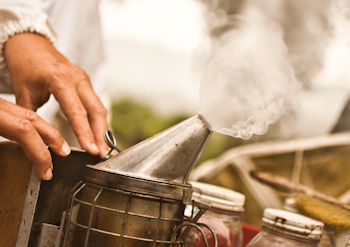 "The smoke masks their alarm scent when you open the hive. It confuses and calms them. They ball around the queen and become more docile," she tells us. "People tease us about our bee aroma therapy."
"The smoke masks their alarm scent when you open the hive. It confuses and calms them. They ball around the queen and become more docile," she tells us. "People tease us about our bee aroma therapy."
In addition to their critical role in perpetuating vegetation, the product of these intense little creatures is one of nature's most perfect foods. Honey is the only food that doesn't spoil.
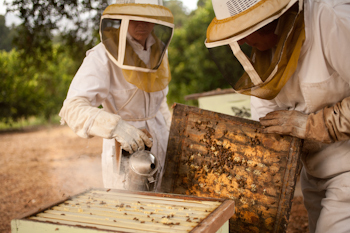 Julie outlines its medicinal benefits: "Honey has anti-oxidants, it's anti-fungal, anti-bacterial and can produce a tolerance for local pollen allergies when the honey is also local," she tells us. This is not to mention the shear joy of savoring their artisan blends the night before.
Julie outlines its medicinal benefits: "Honey has anti-oxidants, it's anti-fungal, anti-bacterial and can produce a tolerance for local pollen allergies when the honey is also local," she tells us. This is not to mention the shear joy of savoring their artisan blends the night before.
... and the bees, while we stood there in the morning sun. They flew in and out of the hive on a mission, on a highway to pollen, ignoring our presence for more important business and making a steady drone in their passing.
"We just think of that as the breath of the hum of God."

